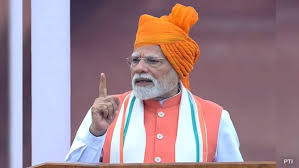On August 15th this year, in the course of a rather lengthy Independence Day address to the nation, Prime Minister Narendra Modi made a renewed commitment to reforms. He stated that while his government had implemented many reforms over the past 11 years, it was time to initiate next-generation reforms. To this end, he announced the formation of a task force to identify the next set of reforms “to suit the 21st century, to fit the global environment, and to align with the vision of making Bharat a developed nation by 2047”.

Though Modi has spoken about “Reform, Perform, and Transform” before, I believe this is the first time he has explicitly expressed his commitment and intent by forming a task force for the same. He mentioned that the task force will finish its work within a set timeframe, though he didn’t reveal the timeline. Modi also announced that the government plans to introduce the next phase of GST reforms as early as this October. Modi stated that this Diwali will be Double Dhamaka for Indian citizens.
It is not hard to see why there is a sudden focus on reforms now. In India, everyone talks about the need for reforms constantly, but only during major crises do they actually get implemented. Shankkar Aiyyar explains this well in his important book – Accidental India: A History of the Nation’s Passage through Crisis and Change. In the book, some of the examples given are:
- India undertook the Green Revolution due to our food crisis and ‘Ship-to-mouth’ existence in the 60s, which eventually compelled us to carry out agricultural reform.
- The White Revolution, or the “Operation Flood,” was a response to the widespread shortage of milk and dairy products in India during the 1970s.
- The economic reforms and liberalisation of the economy in 1991 were driven by a balance of payments crisis and the threat of a sovereign default.
Likewise, I will add that the Covid pandemic brought back the focus on “Self-Reliance” through the Atma Nirbhar programme.
Even former finance minister Yashwant Sinha stated that the 1991 reforms were carried out under duress.
Similarly, the times we are in now have triggered the need to kick-start the next wave of serious reforms, and it is for this reason that Modi spoke at length about the need to unleash them quickly. We just had a military encounter with our neighbour, Pakistan, when Pakistan-supported terror raised its ugly head again in Pahalgam this April. We continue to stay engaged in Operation Sindoor. Relations with China are slowly in the mend after souring in 2020, following the Galwan incident. The Russia-Ukraine war, ongoing since 2022, has disrupted our foreign trade. But apart from the first, the other two have been around for a few years now. The latest issue is the threat of tariffs from the US, which has, in one stroke, linked these seemingly unrelated issues and created a larger complex crisis that we are facing for the first time since the Covid pandemic.
“Never let a good crisis go to waste” is a frequently cited saying during challenging times. As a nation, we must, of course, seize the opportunity provided by the current crisis and implement tough reforms. GST is a good place to start. Although I don’t agree with the widespread view that India has a flawed GST regime, there is undoubtedly room for review and reform. I have previously mentioned that waiting forever for a perfect GST would mean never having one. Introducing GST and making improvements along the way was a good approach. That said, should we have waited eight long years to conduct a comprehensive review and address the gaps? By announcing that a “New Improved” GST will be in place by Diwali this year, the Prime Minister has, in effect, given his team a mandate to get this done quickly. The initiative to set up a task force to look at other reforms is also commendable.
Why not unleash the next wave of reforms in the farm sector? The farm sector has been challenging to navigate, even for Modi Sarkar, which prides itself on being decisive. In its first term, it had to withdraw the Land Acquisition ordinance before implementing the much-needed changes to the original Land Acquisition Bill of the UPA government. It is widely acknowledged that the bill’s provisions hinder timely land acquisition, threatening capital-intensive projects. Land owned by farmers, though non-arable, was essentially the sticking point.
In the second term of this government, it had to roll back the farm bill again due to severe pressure from farmer lobbies in states like Punjab and Haryana. In trade negotiations with the US, one of the sticking points is the removal of tariffs on agricultural produce from the US. Since, as a country, we are not in a position to remove tariffs on farm produce yet, we have pushed back on the trade deal. Significantly, it was at an event to commemorate the legendary agricultural scientist Dr. M.S.Swaminathan’s centenary that Modi said he is willing to pay a personal price for holding tight on tariff cuts on farm produce as demanded by the US. Modi should form an expert task force with a leader, like Swaminathan, to steer it, and once and for all, get the farm sector reforms moving. Otherwise, even decades from now, we will continue to face below-par productivity in the agricultural sector.
This brings me to the core of this post. The title RRR has nothing to do with the pan–India blockbuster directed by S.S. Rajamouli, which went up to the Oscars and won several awards. It is all about “Reforms.” Should we not shun the reactive approach we have taken so far towards reforms? Should we not continuously review the reforms we have implemented and make improvements in a timely manner? Should we only carry out reforms under duress and during a crisis?
The answer is NO, and therefore, I assert that it is time we adopt an R-R-R model, whereby we continuously Reform, Review and Repeat. Reforms must not be at the mercy of crises – good or bad.
